A Word from our Executive Director
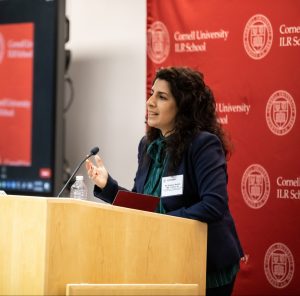
Adi gives remarks at the ILR WIDE Launch Event in NYC this spring

Adi gives remarks at the ILR WIDE Launch Event in NYC this spring
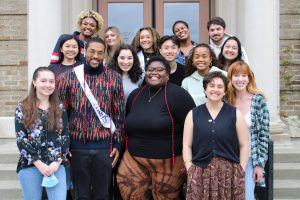
Our Spring 2022 EDUC 2610 Facilitators.
Congratulations to our corded graduated seniors!
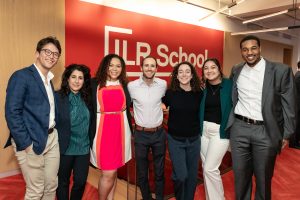
IDPeople in NYC for the ILR WIDE Launch Event this Spring
From left to right: Dylan VanDuyne ’18, Adi Grabiner Keinan, PhD, Victoria Phillips ’17, Mitchell Gronowitz ’17, Hadar Sachs ’17, Kathryn Stamm ’22, David Moore ’22
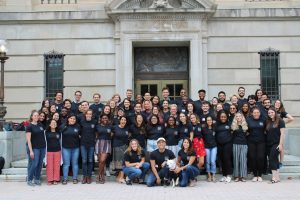
Community at Cornell Facilitators in 2019
After offering the program for the last four years, and conducting thorough assessment for the last three, we are excited to see the profound impact on students and the Cornell community. Students express seeing others in a more complex way, feeling more prepared to form meaningful connections across difference, and feeling more connected to others at Cornell.
In response to student interest and enthusiasm, we are continuing to develop and offer academic courses beyond EDUC 2610: Intergroup Dialogue.
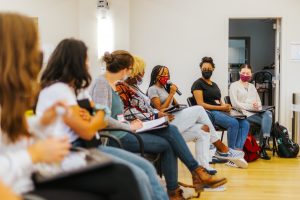
Some of our facilitators in our fall 2021 pre-semester training
We have also seen in surveys and heard from students that they wished to have more opportunities to explore current conflicts. Partnering with Cornell’s Learning Where You Live initiative, IDP is debuting a course in which students get to spend each week dialoguing about an issue of political or social import. We hope that holding the course in residence halls (as opposed to a traditional classroom) will encourage openness and honesty.
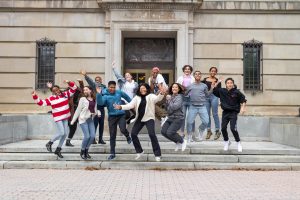
Fall 2021 EDUC 2610 Facilitators
This course aims to provide first-year students with the opportunity to reflect on purpose in life and how being at Cornell might impact their own experiences with identity, meaning, and direction. Participating students will be supported in developing and using critical dialogue skills to understand their experience with purpose in life and how social identities relate to their exploration of and/or commitment to purpose.
A course for students to have genuine conversations about and across political differences, to connect with themselves and others about who they are, what they believe, and how they act as agents within political systems. Participants will gain skills for communicating effectively across differences, reflect on the impact of engaging with others whose political perspectives are different from our own, and work collaboratively to foster a “brave space” where curiosity and a willingness to understand are promoted.

Human connection is essential in all of our offerings, and from the semester-long experience of EDUC 2610 (Intergroup Dialogue) to the hours-long experience of Community at Cornell (CAC) or an IDP workshop, 65% of participants indicated that our programming helped them feel more connected to others. As one workshop participant described it, they learned “how important shared vulnerability is to creating connections. It’s easy to forget that in a hierarchical context like academia.” 72% of participants, like this EDUC 2610 (Intergroup Dialogue) student, also report developing a greater interest in forming more meaningful connections with others: “As a result of IDP, I plan to engage in more meaningful conversations with the people who are in my life and make an effort to establish deeper human connections with the people I meet in the future.”
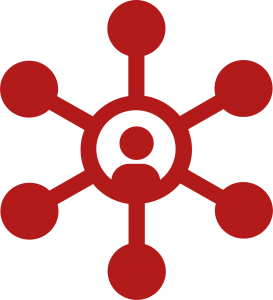
Exploration of personal, interpersonal, and structural manifestations of social identity are at the core of our work, and this is reflected in participants’ survey responses. For example, most West Campus staff reported thinking about their own identities in a more complex, nuanced way (74%) and feeling more interested in understanding others’ experiences of social identity (92%) after their sessions with IDP. At the end of the Advising Across Difference course, participants also demonstrated increases in awareness of social identities and their roles in interactions with students; “[This course] provided me with the understanding of specific biases I bring to my advising, helped me to recognize this as I advise and provided me with strategies to better advise.”
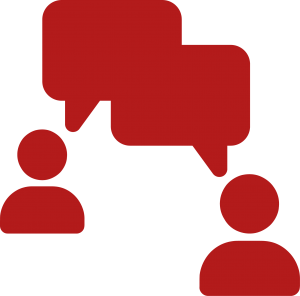
The learning that happens in our programs is made possible by intergroup communication. Students in NBA 6870 (Leading Across Difference), IDP’s course for MBA students, experienced increased self-efficacy in their ability to have such rich, critical conversations, with the proportion of students agreeing with the statement “I feel like I have the skills necessary to engage effectively in challenging conversations” increasing dramatically from the pre-survey to the post-survey (42% to 88%). Similarly, many faculty who participated in the Building Connections with Dialogue program left feeling more capable of leading difficult conversations with students (60% to 91%, pre- to post-), participating in difficult conversations with colleagues (48% to 82%), and more capable of remaining in conversation with those whose perspectives they disagree with (56% to 88%): “I’ve used the skills in conversations with students, faculty, with my children and partner. I still get stuck but I can palpably feel my patterns and ways of handling these conversations shifting- especially on an emotional level. I feel I don’t shut down as easily as I used to.”
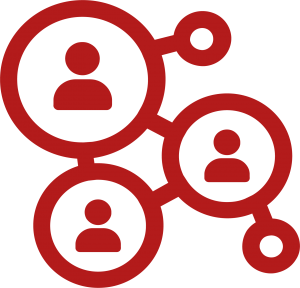
Across our 7-week ILRID 4675 (Inclusive Leadership) course, our course for grad students and postdocs, trainings with West Campus residential staff, and single-session workshops, a majority of participants indicate that, as a result of their experience with IDP, they feel more capable of identifying inequities (grad students and ILR course: 49% to 92%, pre-to post-. West and workshops, post- only: 72%) and taking action to reduce them (grad students and ILR course: 29% to 85%, pre-to post-. West and workshops, post- only: 71%. For strategic change to occur, it is necessary (though not always easy) to confront existing inequitable systems and one’s own role within them, a practice that was described by this ILRID 4675 student: “I had a lot of my viewpoints either bolstered or challenged in class discussions and in readings. I think that my understanding of equity issues is more balanced and nuanced than previously. Looking at the complexity of entrenched structures often leaves me feeling powerless, however at the same time I know that is not so.”
Designed for the Cornell community, IDP Guides dive deeper into specific intergroup dialogue skills and topics for self-guided learning and exploration. Our guides include: “Community Agreements,” “Inclusive Curriculum Review”, “Listening & Learning with ‘I’ Statements (our podcast guide for educators)”, “Political Conversations”, and “Using LARA”. Members of the Cornell community are welcome and encouraged to use IDP Guides for educational purposes.
Have an idea or request for a new guide? Let us know and we might create it!
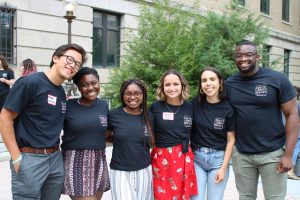
Community at Cornell IDP Alumni Facilitators in 2019
From left to right: Dylan VanDuyne ’18, Alicia O’Neal ’18, Alexis Wilson ’19, Sarah Aiken ’18, Maya Portillo ’17, Baba Adejuyigbe ’18
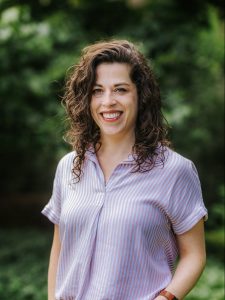 Julia came to Cornell as a Ph.D. student with a focus on promoting equity and justice in public health and a passion for doing so in and through academic contexts. She has since had many roles at Cornell, including leader of a diverse, cross-college undergraduate program, instructor, academic advisor, curriculum developer, researcher, and research mentor. Julia’s first exposure to IDP, her engagement with the second iteration of its course for academic advisors, powerfully and positively challenged her approaches to advising, teaching, and collaboration. As IDP’s Engagement Specialist, Julia leads the development of new opportunities for students, faculty, and student-facing staff to engage in meaningful educational processes and provides consultation and support to Cornell staff and faculty who are working to create inclusive communities for undergraduate students on campus.
Julia came to Cornell as a Ph.D. student with a focus on promoting equity and justice in public health and a passion for doing so in and through academic contexts. She has since had many roles at Cornell, including leader of a diverse, cross-college undergraduate program, instructor, academic advisor, curriculum developer, researcher, and research mentor. Julia’s first exposure to IDP, her engagement with the second iteration of its course for academic advisors, powerfully and positively challenged her approaches to advising, teaching, and collaboration. As IDP’s Engagement Specialist, Julia leads the development of new opportunities for students, faculty, and student-facing staff to engage in meaningful educational processes and provides consultation and support to Cornell staff and faculty who are working to create inclusive communities for undergraduate students on campus.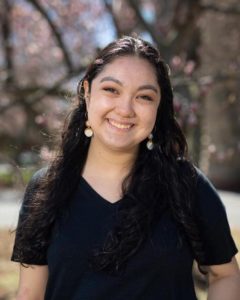
Kathryn’s involvement in IDP started when she did her orientation session in August 2018 and she has been involved with the program ever since. Having just finished her BA in Literatures in English and American Studies, we are excited to share she will be joining the team full time in the fall as our Teaching and Research Assistant. In her time with IDP, Kathryn has facilitated something like 100 sessions.
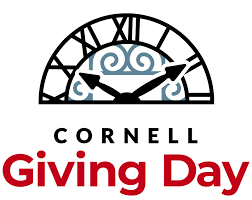 A huge thank you to everyone who supported IDP for Giving Day this spring! We raised $4,308. The funds raised, as well as other generous gifts from alumni, enable us to continue our existing offerings for students, alumni, faculty, and staff and continue to expand our selection of offerings and abilitiy to work with new groups. Your support allows us to bring dialogue into more spaces and to increase our impact on campus climate.
A huge thank you to everyone who supported IDP for Giving Day this spring! We raised $4,308. The funds raised, as well as other generous gifts from alumni, enable us to continue our existing offerings for students, alumni, faculty, and staff and continue to expand our selection of offerings and abilitiy to work with new groups. Your support allows us to bring dialogue into more spaces and to increase our impact on campus climate.